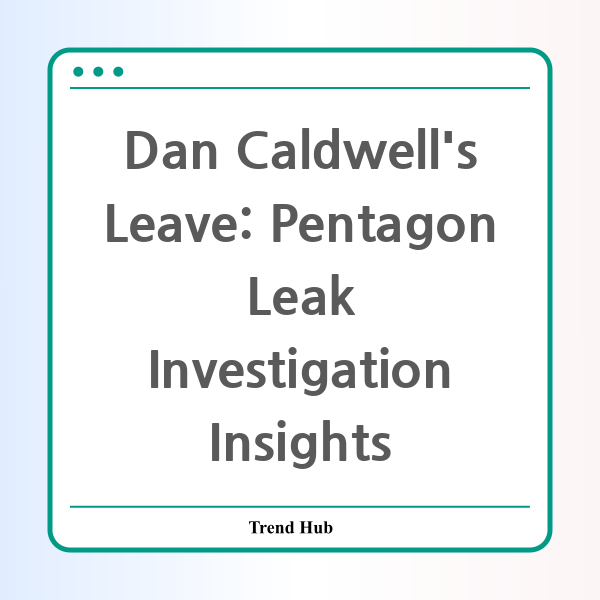* This website participates in the Amazon Affiliate Program and earns from qualifying purchases.

In recent news, Dan Caldwell, a prominent adviser to U.S. Defense Secretary Pete Hegseth, has been placed on administrative leave as part of a significant leak investigation at the Pentagon. This development raises critical questions about internal security and the management of sensitive information within one of the most powerful institutions in the United States.
Caldwell's departure from his role has not been officially clarified, with details surrounding the alleged unauthorized disclosure remaining vague. According to sources, this investigation has been aggressively pursued in light of the current administration's commitment to tighten controls over national security leaks. The memo indicating the investigation was signed by Hegseth's chief of staff and advised a thorough inquiry into recent unauthorized disclosures of sensitive information.
What makes this situation particularly interesting is Caldwell's background and previous statements that have sparked controversy among policymakers. As a Marine Corps veteran who served in Iraq, Caldwell's views on military engagement, especially regarding conflicts such as the Iraq War and U.S. assistance to Ukraine, have been described by some as isolationist. His advocacy for a reduction in U.S. military involvement abroad aligns with a faction that seeks to reshape America's defense priorities amidst ongoing global tensions.
One noteworthy aspect of Caldwell's comments includes his perspective on the Iraq War, where he argued that the U.S. would have been better off if its troops had never engaged in the conflict. Such statements highlight a broader debate within U.S. defense circles about the nature and extent of American military involvement overseas.
The significance of Caldwell’s role as an adviser to Hegseth cannot be overstated. His contributions to key discussions, such as those related to national security challenges like the Houthi strikes in Yemen, have positioned him as an important figure in the current administration's approach to defense strategy. However, with his recent administrative leave, questions arise about the future of his influence and the potential implications of his departure for ongoing military and diplomatic initiatives.
As this investigation unfolds, it brings to light essential themes about transparency, accountability, and the handling of classified information within the Department of Defense. The American public has a vested interest in understanding the consequences of such leaks, particularly how they can affect national security and military operations.
Moreover, the scrutiny surrounding Caldwell's situation is reflective of a broader trend in which senior officials are increasingly held accountable for their actions and disclosures. In recent months, Hegseth has implemented a series of firings among high-ranking military officials as part of an effort to instigate a cultural shift within the Pentagon. This could signal a new era of leadership that prioritizes stringent controls over sensitive information, aiming to prevent further leaks that can compromise national security.
In conclusion, as the investigation progresses, the implications of Caldwell's leave and its subsequent effects on U.S. defense policy will be vital to watch. Will it usher in a new wave of transparency and accountability, or will it result in more confusion and instability within an already complex military landscape? The answers may not be immediate, but they will undoubtedly shape the future direction of U.S. defense strategy and governance.
* This website participates in the Amazon Affiliate Program and earns from qualifying purchases.